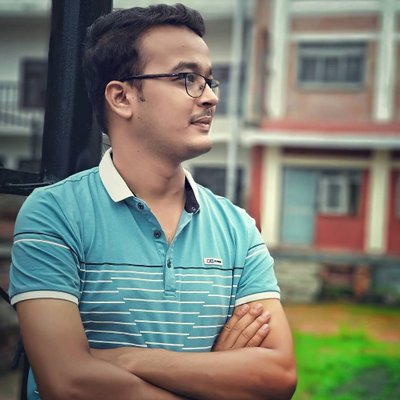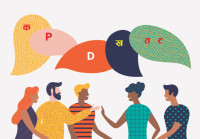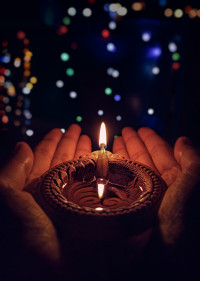As it is
In fragments
Whining and grunting, I yank myself out of bed. It is yet another morning, and I’m not in the mood to exist.
Bibek Adhikari
4:20 am. The alarm goes off, jolting me out of sleep. With an unenthusiastic hand, I slam and silence the screaming monster. I toss and turn, look at the ceiling, force my sleep-laden eyes to stay open. My mother scuttles in the hallway—the muffled sound of clattering cutlery is my morning music. I reach for my seven-year-old cellphone, check emails, scroll through the newsfeed, like/comment on some photos, and turn the WiFi off. I close my eyes and picture the day ahead. I don’t like what I see; I open my eyes. Whining and grunting, I yank myself out of bed. This is yet another morning, and as always, I’m not in the mood to exist.
5:15 am. The forlorn streets welcome me coldly with a derisive smirk. With a backpack slung over my shoulder, I walk the dusty—if not muddy—streets, trying not to slip and break something. Unforeseen tragedies eye me from every corner. Startled by my footsteps, some dogs raise their heads, and upon seeing a familiar figure, go back to sleep. One or two high school students pass by, mentholated cigarettes dangling from their thin lips. I shove my earphones deeper into my ears, listen to audiobooks in a clipped Midwest accent, and try to ignore the world. I wait at the bus stop, a myriad of thoughts swimming in my head, breaking the monotony of the narrative that had been playing. Inhaling the pungent, musty smell of dozens of foul bodies, I commute to college—the cradle of boundless incompetence and stupidity.
6:15 am. Already 15 minutes late for class, without a trace of remorse or shame, I walk in, greet the professor with a nod and a smile, go to the last row, and flop down in the chair. Some 20 heads bob up and down as the professor explains how Waiting for Godot is the perfect tragic-comedy of our time. I jot random notes, doodle, write uninspired verses along the margin, and daydream. Over tea and samosas, my fellow students and I discuss career choices, ways of making more money, going abroad or getting married, and not losing our minds if we stay in this godforsaken country.
9:45 am. I clock in at work, thinking about the interminable day that lies ahead. Drinking a mug of bitter, burnt coffee, I scan my email. I compose polite but unfeeling replies. I check the pending tasks, make a list of the upcoming work, and once in a while, stare into space. I greet my coworkers, crack a few jokes, scan the news, and get to work. You know what work is, right? To quote Philip Levine, “If you’re old enough to read this, you know what work is, although you may not do it.” Or, you may do it, but not really like it.
11:30 am. To satiate my ever-growing hunger, I sit down with Matthew, my American friend from work, and shove one heaping spoonful of rice after another into my mouth. Between bites, we talk, talk, talk. From politics to poetry to philosophy. As it happens, I’m ill-read and often wrongly taught about almost everything. I’m astounded by how little I know about my own language and culture. After lunch, soaking up the sun and passing a cig around are two of my favourite pastimes.
12:30 pm. Back to work. Bum in the chair, eyes glued to the laptop screen, fingers swiftly moving above the keys. I write a few sentences, delete them, write the same sentences, delete them again. Writing is a painful process. But I keep at it—editing and revising every single sentence to try to make the document as readable as possible. Whoever said “work is something you do and not a place you go” is absolutely right.
3:45 pm. Munching on snacks. Usually, a plateful of greasy momos washed down with some weak tea. Then I chew on some anise seeds afterwards, to ward off the bad smell. What is best are the conversations after, the laughter, the mirth shared, which also happens to be a perfect way of escapism. Losing oneself in mindless mumbo jumbo and trying not to think about that blasted existential question—what, after all, is the purpose of life?
6:45 pm. Commuting back home. Either in the office’s shuttle or the empty public buses. Shoving my earphones in again, I try too hard to follow the narrative, but losing the incoherent thread of events, I end up replaying the same audio over and over. Often, I look out at the scintillating night lights with a befuddled mind and forget the everyday problems of everyday life. Forgetting is sweet.
8:20 pm. Dinner. Four of us sit quietly, almost comfortably. We pass the flatbread, help each other with generous second and third helpings. Like our gossamer lives, we tear the rotis in pieces, use them to pinch the spicy curry, and gulp the morsels down. What ensues is small talk. Bad weather, heavy traffic, broken drain pipes, coronavirus, death of a distant relative. We mutter and grunt approval. We shake our heads in disapproval. Monosyllables trickle from the corners of our mouths like drool. What is a family if not a throng of people eating and whining under the same roof?
8:50 pm. Flipping through the pages of a bulky textbook. I try to keep track of the assignments. Term papers suck all my energy. After staring at words all day long, I’m not in the mood to read or write. Poetry has become a mere chore. And when words don’t pour forth, I stare at the blank page, self-doubt bubbling in my heart, and I question if I’ve been chasing illusions all this time.
10:30 pm. Hit the sack. Before that, I shove the earphones in one last time to listen to some enlightened gurus blither on YouTube. I think of gods and demons and naked angels—and their assorted couplings. With a semi-hard on, I imagine myself preaching about life and happiness and nirvana to a bunch of hippie women. In my dream, I’ve grown into a fat Buddha, but with a long, grey beard that points towards heaven. I say, “I’m my own god,” and close my eyes.
11:11 pm. Sleep comes to this jaded body—at last—and darkness engulfs everything.




 11.84°C Kathmandu
11.84°C Kathmandu










